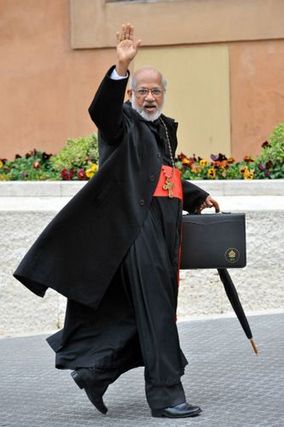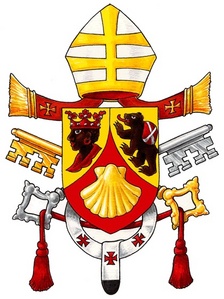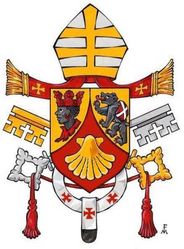 The Cardinals have determined that the Conclave will begin on 12 March 2013. The Votive Mass Pro Eligendo Pontifice (For the Election of the Pontiff) will be offered in the morning at Saint Peter’s Basilica by the Cardinal Dean and later that afternoon the cardinals will process from the Pauline Chapel to the Sistine praying the Litany of Saints.
The Cardinals have determined that the Conclave will begin on 12 March 2013. The Votive Mass Pro Eligendo Pontifice (For the Election of the Pontiff) will be offered in the morning at Saint Peter’s Basilica by the Cardinal Dean and later that afternoon the cardinals will process from the Pauline Chapel to the Sistine praying the Litany of Saints.
Tag: motu proprio
Papal document establishing Office of the New Evangelization: Ubicumque et Semper (Everywhere and always)
Apostolic Letter in the Form of Motu Proprio
Ubicumque et Semper
It is the duty of the Church to proclaim always and everywhere the Gospel of Jesus Christ. He, the first and supreme evangelizer, commanded the Apostles on the day of his Ascension to the Father: “Go therefore and make disciples of all nations, baptizing them in the name of the Father and of the Son and of the Holy Spirit, teaching them to observe all that I have commanded you” (Mt 28:19-20). Faithful to this mandate, the Church–a people chosen by God to declare his wonderful deeds (cf. 1 Peter 2:9)–ever since she received the gift of the Holy Spirit on the day of Pentecost (cf. Acts 2:14), has never tired of making known to the whole world the beauty of the Gospel as she preaches Jesus Christ, true God and true man, the same “yesterday and today and for ever” (Heb 13:8), who, by his death and Resurrection, brought us salvation and fulfilled the promise made of old. Hence the mission of evangelization, a continuation of the work desired by the Lord Jesus, is necessary for the Church: it cannot be overlooked; it is an expression of her very nature.
Pope issues new laws to conform Vatican to European financial controls
New Papal document: Ubicumque et Semper (Everywhere and always) making a Vatican Office for the New Evangelization
The Holy Father published a long-awaited Motu Proprio, Ubicumque et semper, by which he established a new office (dicastery) at the Roman Curia: “Pontifical Council for Promotion of the New Evangelization.” The new head of the Council is, as you know, Archbishop Rino Fisichella.
The objectives of the new Pontifical Council:
- To deepen the theological and pastoral meaning of the new evangelization.
- To promote and to foster in close collaboration with bishops’ conferences, teaching of the Magisterium relative to the new evangelization.
- To make known initiatives already under way in local churches and to promote new initiatives, involving also resources of religious institutes and groups of the faithful and new lay communities;
- To study and to foster the use of modern means of communications as instruments for the new evangelization.
- To promote the Catechism of the Catholic Church.
A summary of Ubicumque et semper can be read here.
I am happy that a papal document finally appeared since it was expected since four months ago. Now a more concerted effort at the needs of evangelization will be worked on by the Roman Curia and that good works already in play with groups like Communion and Liberation, Opus Dei, Focolare, Sant’Egidio will be more coordinated and collaborated with. I hope the big religious orders like the Benedictines, Franciscans and Dominicans will respond positively to the hopes and desires of the Pope. The expectation of the new Council are looking to re-energize the work of evangelization of culture and to give renewed interest and thrust of the Church as missionary. Please note, secularism, not secularity needs to be addressed by the entire Church, not just the bishops and certainly not just the Roman Curia.
The Pope said, “At the root of all evangelization there is no human project of expansion, but the desire to share the priceless gift that God wished to give us, sharing His life with us.”
There are, however, a number of missed opportunities already since the announcement of the Council: there was a too long of wait for the motu proprio, the motu proprio is only available in Latin and Italian at this point, the staff has not been announced, and there is no web presence for the new Council as of yet. Another example of not doing the homework on the part of those who work for the Pope.
Sacramentorum sanctitatis tutela
The Congregation of the Doctrine for the Faith published today the norms reforming the law and process in dealing with clergy sex abuse cases under a motu proprio signed by Pope Benedict XVI, titled, Sacramentorum sanctitatis tutela (May 21, 2010).
The historical background: Historical Intro SST.pdf
The letter to the bishops: SST letter to bps.pdf
The Norms (Normae de Gravioribus Delictis)
Omnium in Mentem (in English)
On 15 December 2009, Pope Benedict made public some “clarifications” (revisions?) he made to the 1983 Code of Canon Law in a motu proprio titled, Omnium in Mentem. To date, no English translation of the motu proprio has been made available, until now that is.
Clarifications on Summorum Pontificum
The Pontifical Commission Ecclesia Dei which oversees various matters pertaining to the praying of the Missal of Blessed John XXIII, sometimes called the Missal of 1962, or simply, THE Mass, issued a few clarifications on what the Pope intends to happen as a result of the publication of the motu proprio Summorum Pontificum which liberated from ideologues the praying of the Missal of Blessed John.
What a difference a Motu Proprio makes
… sing to the tune of “What a difference a day makes“
What a difference a Motu Proprio makes
Twenty-four little hours
Brought the sun and the flowers
Where there used to be rain
My yesterday was blue, dear
Today I’m part of you, dear
My lonely nights are through, dear
Since you said you were mine
What a difference a Motu Proprio makes
There’s a rainbow before me
Skies above can’t be stormy
Since that moment of bliss, that thrilling kiss
It’s heaven when you find Latin on your menu
What a difference a Motu Proprio makes
And the difference is you
What a difference a Motu Proprio makes
There’s a rainbow before me
Skies above can’t be stormy
Since that moment of bliss, that thrilling kiss
It’s heaven when you find Latin on your menu
What a difference a Motu Proprio makes
And the difference is you
Thanks to
Motu Proprio: Variations to the Code of Canon Law, canons canons 1008, 1009, 1086, 1117 & 1124 –Omnium in mentem
Vatican
City, 15 December 2009 (VIS) – Made public today was Benedict XVI’s Motu
Proprio, “Omnium in mentem”. The document is dated 26 October 2009
and contains two variations to the Code of Canon Law (CIC), variations which
have long been the object of study by dicasteries of the Roman Curia and by
national episcopal conferences.
The document published today contains five
articles modifying canons 1008, 1009, 1086, 1117 and 1124. According to an
explanatory note by Archbishop Francesco Coccopalmerio, president of the
Pontifical Council for Legislative Texts, these variations “concern two
separate questions: adapting the text of the canons that define the ministerial
function of deacons to the relative text in the Catechism of the Catholic Church (1581), and suppressing a subordinate clause in three canons concerning
marriage, which experience has shown to be inappropriate”.
The variation
to the text of canon 1008 will now limit itself to affirming that “those
who receive the Sacrament of Orders are destined to serve the People of God
with a new and specific title”, while canon 1009 “will be given an
additional third paragraph in which it is specified that the minister
constituted into the Order of the episcopate or the priesthood receives the mission
and power to act in the person of Christ the Head, while deacons receive the
faculty to serve the People of God in the diaconates of the liturgy, of the
Word and of charity”.
Archbishop Coccopalmerio’s note then goes on to
explain that the other changes contained in the Motu Proprio all concern the
elimination of the clause “actus formalis defectionis ab Ecclesia
Catholica” contained in canons 1086 para. 1, 1117 and 1124. This clause,
“following much study, was held to be unnecessary and inappropriate”,
he writes.
“From the time the Code of Canon Law came into effect in the
year 1983 until the moment of the coming into effect of this Motu Proprio,
Catholics who had abandoned the Catholic Church by means of a formal act were
not obliged to follow the canonical form of celebration for the validity of
marriage (canon 1117), nor were they bound by the impediment concerning
marriage to the non-baptised (canon 1086 para. 1), nor did they suffer the
prohibition on marrying non-Catholic Christians (canon 1124). The
abovementioned clause contained in these three canons represented an exception
… to another more general norm of ecclesiastical legislation according to
which all those baptised in the Catholic Church or received into her are bound
to observe ecclesiastical laws (canon 11).
“With the coming into effect of
the new Motu Proprio”, Archbishop Coccopalmerio adds, “canon 11 of
the Code of Canon Law reacquires its full force as concerns the contents of the
canons thus modified, even in cases were there has been a formal abandonment.
Hence, in order to regularise any unions that may have been made in the
non-observance of these rules it will be necessary to have recourse, if
possible, to the ordinary means Canon Law offers for such cases: dispensation
from the impediment, sanation, etc”.
The Latin and Italian texts are here.

